↑↑↑I will always share with you various interview questions and interview answers, please click above to follow [Operation Interviewer Aaron]
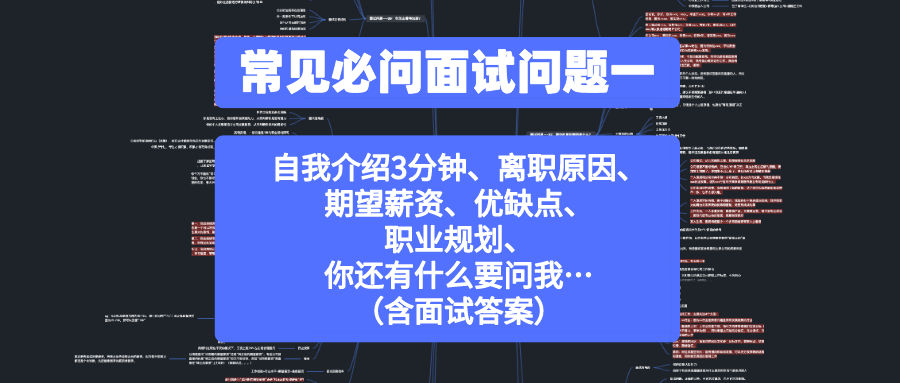
Hello, I’m Aaron, an operation interviewer. I have 8 years of Internet operation experience. I have served as the COO of an Internet company. I am now the co-founder of a company.
I am from the perspective of the interviewer, I only tell you the ready-to-use interview skills to help you get an offer and easily find a job!
13 interview questions you must ask no matter what position you are applying for (including interview answers)
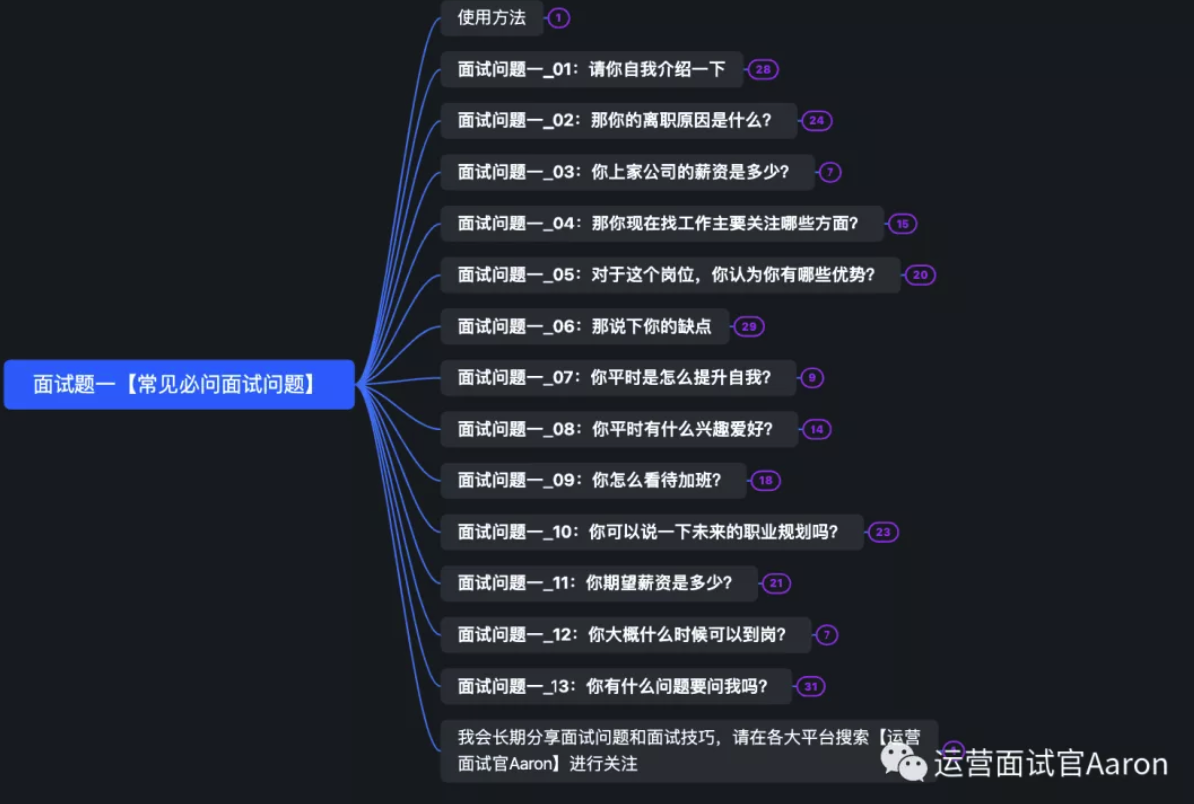

Interview question one_01: Please introduce yourself for 3 minutes
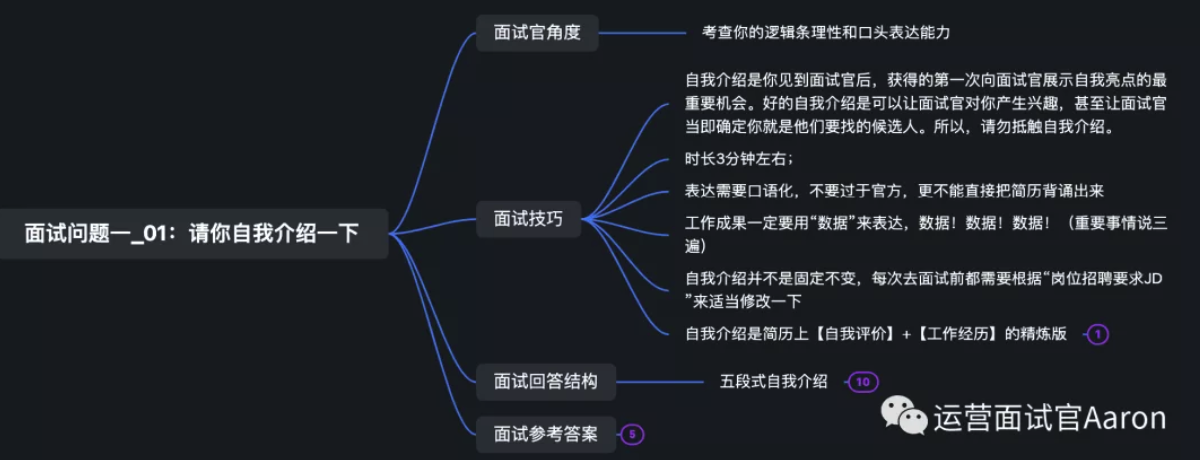
- Interviewer perspective
- Test your logic and verbal expression skills
- Interview skills
- Self-introduction is the most important opportunity you get to show the interviewer your highlights for the first time after meeting the interviewer. A good self-introduction can make the interviewer interested in you, and even let the interviewer immediately confirm that you are the candidate they are looking for. So, don’t resist self-introduction.
- It takes about 3 minutes;
- The expression needs to be spoken, not too official, let alone recite the resume directly
- Work results must be expressed in "data", data! data! data! (I tell the important thing three times)
- Self-introduction is not fixed, every time you go to the interview, you need to modify it appropriately according to the "Job Recruitment Requirements JD"
- Self-introduction is a refined version of [self-evaluation] + [work experience] on your resume
Interview question one_02: What is the reason for your resignation?
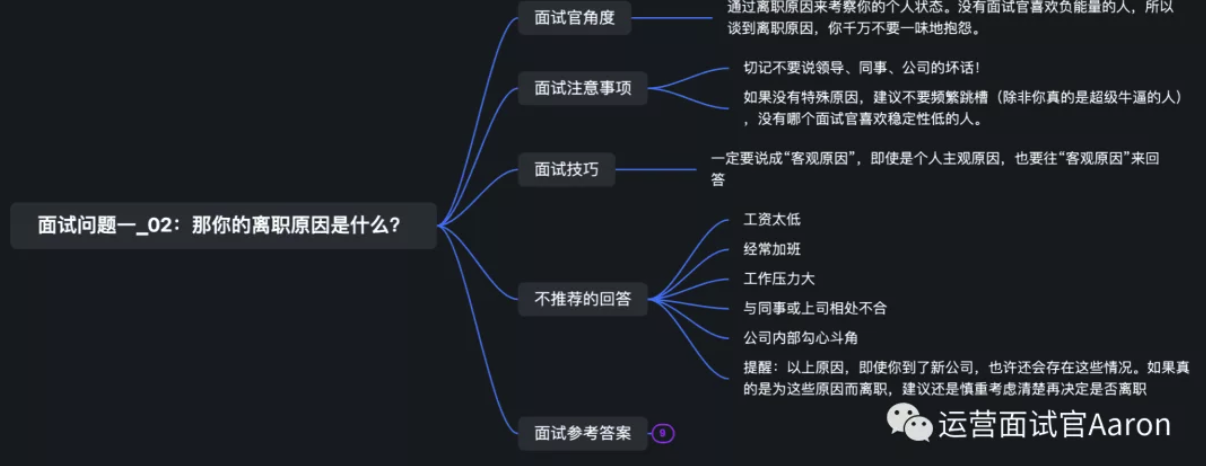
- Interviewer perspective
- Use the reasons for leaving to examine your personal status. There is no interviewer who likes negative energy, so when it comes to the reason for resignation, you must not just complain.
- Interview notes
- Remember not to speak ill of leaders, colleagues, or the company!
- If there is no special reason, it is recommended not to change jobs frequently (unless you are really a super awesome person), no interviewer likes people with low stability.
- Interview skills
- It must be said to be "objective reasons", even if it is a personal subjective reason, it must be answered by "objective reasons"
- Not recommended answer
- Salary is too low
- Often work overtime
- Stress from work
- Disagreement with colleagues or bosses
- Intrigue within the company
- Reminder: For the above reasons, even if you get to a new company, these situations may still exist. If you really resign for these reasons, it is recommended to carefully consider carefully before deciding whether to resign.
Interview question one_03: What was the salary of your last company?

- Interviewer perspective
- Use your salary in the last company as a reference for your offer salary
- Interview skills
- This can only be answered truthfully and cannot be faked, because some companies require you to provide "salary certificate" or "salary flow"
- There is no need to disassemble the salary, some interviewers will decide the offer salary based on the basic salary of your last company
Interview question one_04: Then what aspects do you focus on when looking for a job?

- Interviewer perspective
- Know whether the company meets your job search criteria
- Interview skills
- Tell the truth, speak out your job-hunting standards boldly and confidently, and don't forget your original intentions (otherwise, you won’t find it until you get a job, and you regret it...)
Interview question one_05: For this position, what advantages do you think you have?

- Interviewer perspective
- Your self-awareness;
- Give you a chance to convince the interviewer why he hired you instead of others
- Interview skills
- Give a clear and positive answer, not to be too modest or vague.
- You must answer with JD and give a simple example to prove your selling point. The purpose is to tell the interviewer "I am the person you want to recruit" (eg: JD requires "attention to details", and then to "attention to details" answer)
- Generally answer "3 advantages"
Interview question one_06: Then talk about your shortcomings

- Interviewer perspective
- Will your shortcomings affect your job
- Interview skills
- I can’t answer the shortcomings that have a greater impact on my job, that is, do not answer the required features on JD; at the same time, I will give an example to illustrate that this shortcoming has affected my work, and finally talk about how to correct this shortcoming. (Eg: JD requires "attention to details", but you say "often careless".)
- Avoid avoiding the most important ones, answering the non-professional shortcomings or shortcomings that are not considered shortcomings, answer the real shortcomings. (Non-professional shortcomings: such as picky eaters, not good at shopping with girlfriends, cooking and making a lot of food; shortcomings that can't be considered shortcomings: such as staying up late and being sleepy, being too polite)
- The general answer is "1 shortcoming". Too many shortcomings will reduce the goodwill of the interviewer. People will always remember the bad side of others. This is human nature.
- Fatal shortcomings that cannot be answered
- Procrastination (makes the interviewer think you are very poor in execution)
- Like to be alone, alone (make the interviewer think you can't join the team)
- Careless (make the interviewer think you are careless and always make mistakes)
Interview question one_07: How do you improve yourself?

- Interviewer perspective
- Do you improve your work ability through continuous learning
- Your knowledge acquisition method
- Interview skills
- Self-improvement can be answered from the two aspects of [input learning + output sharing]
Interview question one_08: What are your hobbies?

- Interviewer perspective
- Want to know what you are like outside of work?
- By understanding your hobbies and hobbies to judge your degree of study of the work
- If a candidate has a hobby that invests time and persists for a long time, it is easy to get the favor of the interviewer. Because he knows what the goal he is pursuing and is willing to take action and persistence for the goal. This kind of energy is used in work, and it is easy to stand out. On the contrary, if he is only interested and lacks the spirit of action and research, he can be so careless about his long-term hobbies, and it is impossible to believe that he will be too responsible or professional at work.
- Interview skills
- A hobby refers to a hobby that you have spent a lot of time practicing yourself. It is better than the average person’s hobby that can be called a specialty, rather than the common hobbies such as "watching movies and brushing vibrato" (unless you are interviewing for a game company or vibrato Operation post)
- Generally, answer only one, so that the interviewer feels that you are very focused, and the focus is to highlight the results of your hobbies
Interview question one_09: What do you think about working overtime?

- Interviewer perspective
- The interviewer hopes to hear the answer "I agree with overtime"
- I personally do not advocate overtime, but I still ask job applicants during the interview to understand their views on overtime and whether they exclude overtime across the board.
- Interview skills
- You don’t have to claim to cater to the company that you “do everything you want to do 24 hours a day, 365 days a day”
- Interview notes
- Don’t answer jokes such as "As long as the money is enough, I can work without rest all day long"
- Don’t ask the interviewer if he has overtime pay. It will make the interviewer think that you have too little vision and care about the money. It is recommended to ask HR after the salary negotiation.
Interview question one_10: Can you talk about your future career plan?

- Interviewer perspective
- Is your self-planning clear
- Do you have self-motivated, sense of purpose and self-drive to judge whether you have potential
- Whether your personal development is in line with the company's development, so as to judge your future stability
- Interview skills
- To be honest, generally speaking the career plan of the last 3 years is enough
- Career planning generally follows the following two basic principles.
- ①Choose a promising industry (the key). Only a good industry can give you plenty of room for development.
- ②Keep focus, focus can accumulate, accumulation can achieve achievement.
- The answer is not about your career goals, but how to achieve your career goals
- Get to know the background, current situation and future of the applicant company in advance, and respond appropriately to the company's development, so that the interviewer feels that your career plan is consistent with the company's development, to prove your stability
- Interview notes
- You must not say "start your own business after learning your skills"! If the interviewer continues to ask you whether you will start a business, you shouldn't say it too harshly or directly. You can answer: You can take a wait-and-see attitude towards entrepreneurship, look at the overall environment and opportunities, and explain that you have no plans to start a business in a short period of time.
Interview question one_11: What is your salary expectation?

- Interviewer perspective
- What is your attitude towards salary?
- How do you correctly evaluate your own value?
- What do you think of the gap between your own ability level and salary?
- Are your salary expectations consistent with the company's standards?
- Note that the interviewer is not negotiating salary with you at this time
- Interview skills
- This question is very important and is one of the important factors that determine your final offer salary. If it exceeds the JD salary range, it is basically useless; if it is lower than the JD salary range, the interviewer thinks that the professional ability is insufficient.
Interview question one_12: When will you be available?

- Interviewer perspective
- Know your fastest time to work
- Determine if you have other interview arrangements
Interview question one_13: Do you have any questions for me?

- Interviewer perspective
- Reflect your pattern by the questions you ask
- Interview skills
- Asking some questions related to the job content or position will not only make the interviewer think you want to join the company, but also provide you with more information as a reference for opposing the offer
- Generally, you can ask at most 2
- Interview notes
- Can’t say that there are no questions to ask, which will make the interviewer think that you don’t really want to join the company
- If it is an interview in the employing department, remember not to ask about personnel administration issues such as salary, benefits, working hours, etc. First, let the interviewer think that you are small, profit-only, and only care about money; secondly, issues such as salary and benefits are in the HR category
Summary: 13 interview questions you must ask no matter which position you are applying for (including interview answers)
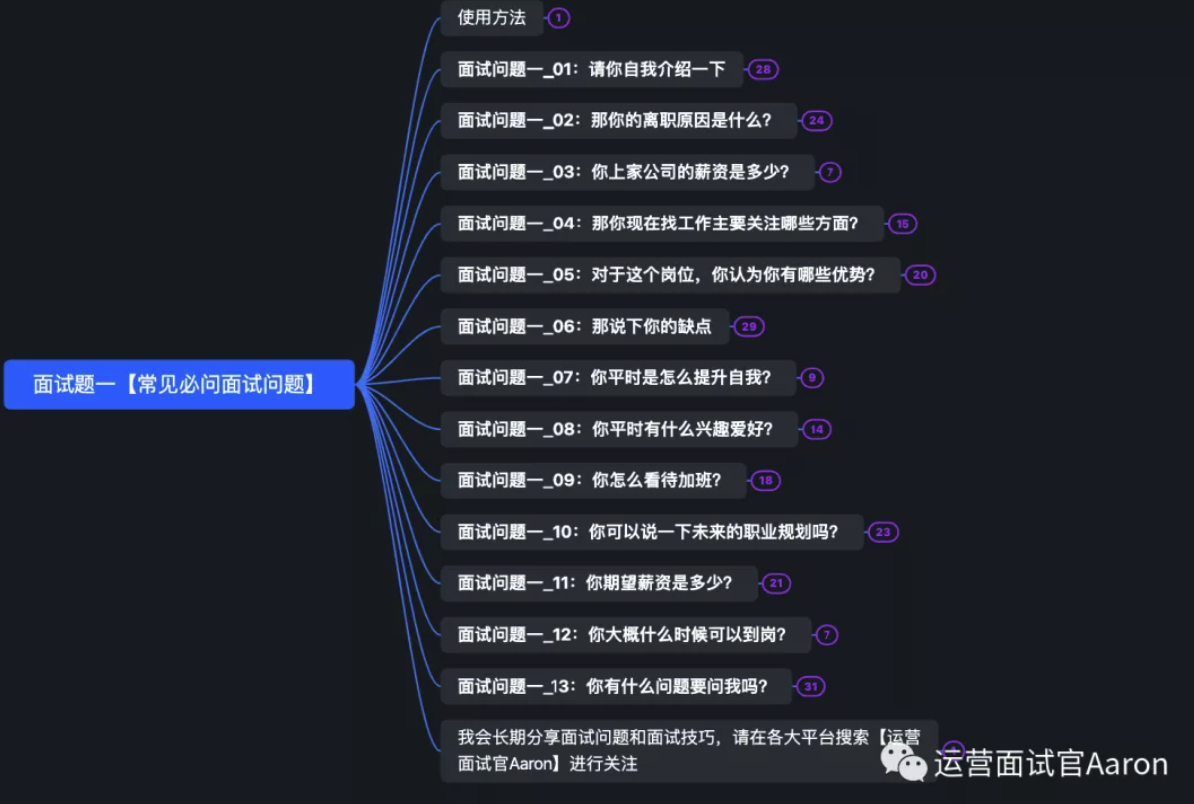

Next article sharing preview
[Interview question 2 that HR likes most (including interview answers)]
Okay, that's it for sharing the interview questions.
I am Aaron, an operation interviewer. I have 8 years of Internet operation experience. I have served as the COO of an Internet company. I am currently the co-founder of a company.
I am from the perspective of the interviewer, I only tell you the ready-to-use interview skills to help you get an offer and easily find a job!
I will always share interview questions and interview answers with you. Please search [Operation Interviewer Aaron] on all major platforms to pay attention!
Finally, I wish you a successful job search, good luck!
↓↓↓Old rules, click on the bottom [Like+Favorite+Comment] to support. I have been sharing all kinds of interview experience with you. By the way, [Repost and share] to friends, help him solve the pain of job hunting~